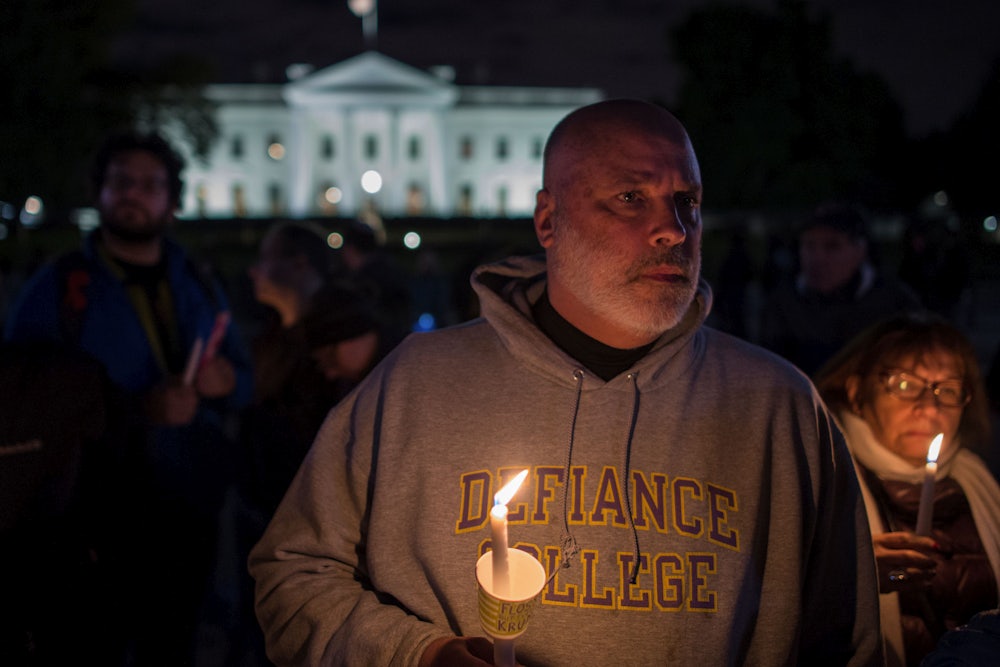“Bring the war home.”
That’s what protesters at the University of Wisconsin chanted in early 1970, denouncing defense-related research at the school during the Vietnam War. Later that summer, four men brought the war to campus. They set off a bomb at the Army Mathematics Research Center, killing a physics graduate student and injuring three others.
Critics were quick to blame the entire antiwar movement. But the attack also triggered sober reflection among the protesters, who asked themselves whether their increasingly aggressive language had encouraged it.
That’s precisely the kind of honest, good-faith reckoning that’s been missing among most Republicans in recent days. Last Friday, police said that a Florida supporter of President Donald Trump, Cesar Sayoc, was responsible for sending explosive packages to Barack Obama, Hillary Clinton, and several other prominent Democrats. Then, on Saturday, 11 people at a Pittsburgh synagogue were murdered by alleged gunman Robert Bowers, who reportedly didn’t vote for Trump but had posted diatribes echoing the president’s overheated rhetoric about the caravan of migrants from Central America.
White House officials responded defensively after both attacks, denying that Trump’s language might have helped provoke them. “The president is certainly not responsible for sending suspicious packages to someone, no more than Bernie Sanders was responsible for a supporter of his shooting up a Republican baseball field practice last year,” White House Press Secretary Sarah Huckabee Sanders said, referring to the attack that critically injured Republican Congressman Steve Scalise last year.
But Bernie Sanders hasn’t encouraged people to behave violently; Trump has. He urged supporters at a rally to “knock the crap” out of anti-Trump protesters, promising to pay any resulting legal bills. He has continuously praised Montana Congressman Greg Gianforte for body-slamming a news reporter. And he grinned happily last week while supporters chanted “CNN sucks,” just days after the network received one of Sayoc’s mail bombs and mere hours after news reports showed Sayoc’s van bearing a bumper sticker with the same slogan.
And Trump certainly fueled anti-Semitic theories that the Central American caravan is funded by Jewish philanthropist and top Democratic donor George Soros, which was a recurring theme on Bowers’s social media account. Trump didn’t name Soros, whom Sayoc also targeted with a bomb, but warned that the caravan “didn’t just happen” and that “a lot of money” was “passing” to it from outside. That’s a clear nod to conspiracists like Bowers.
On Friday, Trump acknowledged that Sayoc “preferred” him over other political candidates. But he refused to admit that his own behavior could have encouraged Sayoc’s assassination attempts. “There’s no blame,” Trump declared. “There’s no anything.”
His comment brought me back to the 1970 bombing at the University of Wisconsin, which shook the antiwar movement to its core. Instead of simply distancing themselves from the attack, protesters asked hard questions about how their own actions might have helped provoke it.
The same bombers had previously tossed a firebomb into an ROTC classroom at the university. And a few days before the 1970 New Year, they stole a plane and dropped a series of explosives onto a nearby ammunition plant. Nicknamed “The New Year’s Gang,” they were lionized as romantic heroes by Wisconsin’s student newspaper and other protesters at the university.
But after the destruction of the math building and the death of the physics student, a 33-year-old father of three, protesters changed their tune. The bombing “was so extreme and unjustifiable and horrible, it stopped us in our tracks,” one activist said. Another noted that the attack “caused a lot of soul searching.” It was “a very pointed reminder . . . that you can’t persuade people of the sanctity of human life by being recklessly unmindful of human life.”
When will Republicans search their own souls about the reckless rhetoric that provoked Sayoc and Bowers? Several GOP senators have released generic statements denouncing violence and calling for civility. But all of these comments ring hollow when they exempt the man who has done more than anybody else to encourage violence and erode civility. “Look, everyone has their own style. And frankly, people on both side of the aisle use strong language about our political differences,” Vice President Mike Pence told NBC News on Saturday. “But I just don’t think you can connect it to threats or acts of violence.”
It’s true that Congresswoman Maxine Waters and a few other Democrats in Congress have engaged in their own kinds of incivility, such as calling on supporters to confront Trump administration officials in restaurants. But the Democratic leadership has unequivocally condemned their behavior.
I’m not expecting Republicans to stop supporting Trump’s policies, just as the protesters in Wisconsin weren’t about to abandon their opposition to the Vietnam War over the actions of the New Year’s Gang. But not a single prominent Republican has stood up over the past few days to state the obvious: Trump’s violent rhetoric encourages violent action.
Decent people can endorse Trump’s views on immigration, health care, taxes, and so on, but decent people do not speak and act like he does. It’s time for Republican leaders to say that, clearly and unequivocally. If they don’t, they will be complicit in any further right-wing political violence that mars the country—and will be remembered as cowards and opportunists, who put their own immediate political concerns above the fate of America.
